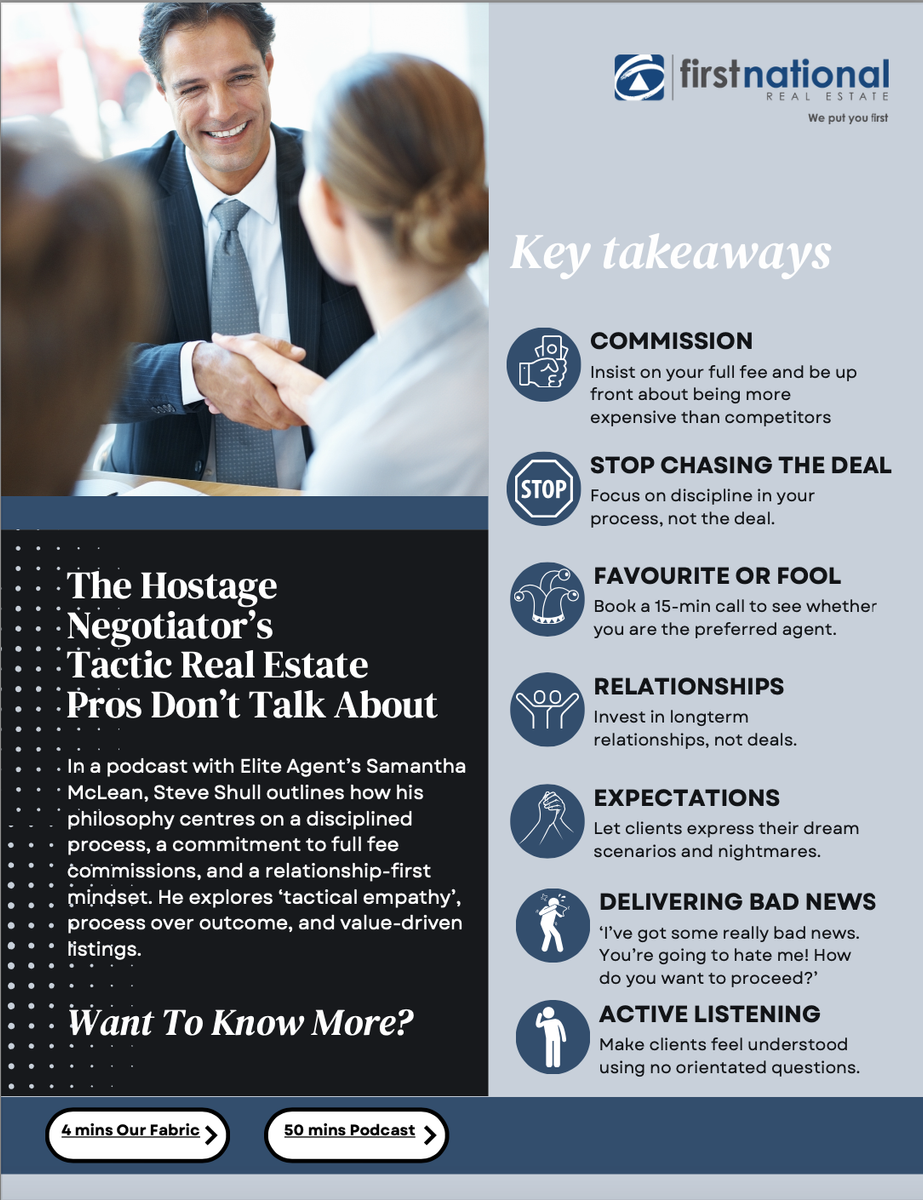Agency Practice

The Hostage Negotiator Tactic Agents Don’t Talk About
Do you sometimes struggle to WIN the lounge room listings battle?
Are you GUILTY of taking responsibility for things beyond your control?
Are you the ‘favourite’ or the ‘FOOL’ in commission discussions?
Do you fall into the TRAP of explaining your value?
What is an ‘accusations audit’ and how can it help you deliver BAD news?
Are you ready to concede you are not in control of your results but ONLY the process?
In that case, you might be ready to consider how Steve Shull’s insights from Chris Voss’ hostage negotiation techniques, could transform your results. It’s well-worth your time.
In a 50 minute podcast with Elite Agent’s Samantha McLean, Steve recently outlined how his philosophy centres on a disciplined process, a commitment to full fee commissions, and a relationship-first mindset.
If you didn’t have time to listen to this intriguing podcast, here’s a detailed exploration of Steve's advice:
1. Philosophy on Commission Fees
Steve is adamant that real estate agents must charge a full fee—typically around 3.5% for a transaction—rather than succumbing to the pressure to discount their services. He argues that when agents work for less than their full worth, they are effectively working for free. This insistence on charging a full fee reflects the true value of the service provided, ensuring profitability and reinforcing the perception of professional worth.
2. The Biggest Mistake Agents Make
‘Stop chasing a deal and focus on building a business’. The most common error, according to Steve, is chasing individual deals at the expense of building a sustainable business. Many agents focus on immediate wins, often neglecting the long-term benefits of a disciplined process. They also tend to clutter their customer relationship management systems with unqualified contacts, treating their databases as dumping grounds rather than tools for nurturing meaningful relationships.
3. The ‘Favourite or Fool’ Approach
A standout element of his strategy is the ‘Favourite or Fool’ method. Steve recommends a brief introductory call—ideally around 15 minutes—to ascertain whether a potential client genuinely sees the agent as their preferred partner. If a client readily agrees to this initial conversation, it suggests they are inclined to trust the agent. Conversely, resistance during this call is a clear indicator that the client may not be serious or might later attempt to negotiate fees downward, effectively categorising the agent as the ‘fool’ in the process.
4. Relationships Over Transactions
For Steve, real estate is fundamentally a relationship business. Rather than focusing solely on closing individual deals, agents should invest in long-term relationship building. When clients feel understood and valued, trust is established far more quickly. This trust is what ultimately leads to repeat business and referrals, making the agent’s role more sustainable over time.
5. Handling Unrealistic Seller Expectations
When sellers harbour unrealistic expectations - particularly regarding pricing - Steve advises a dual-pronged approach. First, encourage sellers to articulate their dream scenario, then probe by asking what the worst-case (nightmare) scenario might look like. This method helps to anchor expectations in reality. If a seller remains rigid and unyielding, it becomes clear that the agent might not be the right fit, and it is better to exit the engagement gracefully than to expend unnecessary effort trying to change their mind.
6. Delivering Bad News Effectively
Put responsibility where it belongs! Steve’s technique for delivering bad news is both simple and effective. He suggests beginning with an ‘accusations audit’ by signalling upfront - 'I’ve got some really bad news, you're going to hate me’ - and then pausing to allow the client to prepare emotionally. Once the stage is set, the bad news is delivered calmly and objectively, followed by an open question such as, ‘How do you want to proceed?’ This method reduces defensiveness and encourages a constructive dialogue.
7. Building Trust Quickly with New Clients
Drawing from tactical empathy - a core insight from Chris Voss - Steve emphasises the importance of making clients feel understood. Agents should utilise active listening and no-oriented questions that prompt clients to share their true thoughts and feelings. This approach, which centres on empathetic engagement rather than aggressive persuasion, accelerates trust-building and sets a collaborative tone for all subsequent interactions
8. Thriving in Today’s Competitive Market
Finally, Steve’s overarching advice is to stop chasing individual deals and instead focus on perfecting the process. He stresses that while agents cannot control external market outcomes, they can control their daily actions, from rigorous CRM management to regular relationship nurturing. By concentrating on the process - through time blocking, disciplined follow-ups, and strategic communication - agents can create a robust, resilient business that stands the test of time.
In summary, Steve Shull’s blueprint for success in real estate is a call to reframe the way agents approach their work: prioritise relationship-building, charge what you’re worth, and focus relentlessly on the process rather than the outcome. These strategies not only enhance individual performance but also contribute to a more sustainable and professional industry overall.
Download our flyer to remind yourself daily of these tips by clicking this image 👉
WA Property Managers: Clarity At Last on Pets & Modifications
With the Commissioner Determinations process now having been in place for six months, Western Australia property managers can now access prior determinations about:
Applications for pets in rentals
Making minor modifications to rentals
Commissioner guidelines for keeping pets in a rental home have now been added to the consumer protection website. Assistance Animals do not require a landlord’s permission and CANNOT be refused (or charged a Pet Bond). They must be either accredited or have received training to provide disability support. More information is available here.
Tenants must complete a Pet Request Form – Form 25
Landlord has 14 days to respond in writing, either approving, approving with conditions, or refusing.
Commissioner Approval Required: Refusing A Pet
A landlord requires commissioner approval to refuse a pet, when:
Premises are unsuitable (lack of fencing)
Too many pets already
Potential damage from the pet will cost more than the bond to repair
Keeping a pet would cause unacceptable health or safety risks
Keeping the pet could cause undue hardship to the landlord
The pet is dangerous under the Dog Act 1976
A landlord can refuse a pet, without Commissioner approval, if keeping the pet would break a law or strata rule (Assistance Animals excepted).
Commissioner Approval Required: Setting Conditions For A Pet
Landlords require commissioner approval if they wish to:
Require a pet to stay outside
Require a bird to be kept in a cage
They do not require approval if they wish to:
Limit the number of pets i.e. no more than two pets
Require that carpets be professionally cleaned every 12 months (and at the end of tenancy)
Tenant Responsibilities
Tenants must:
Clean up any mess made by the pet inside and outside the home
Be responsible for any nuisance e.g. Excessive dog barking
Fix any damage caused by the pet e.g. Cat clawing curtains.
A Pet Bond cannot exceed $260, no matter how many pets a tenant has (and the bond may only be used for pest control (fumigation). Bonds must be lodged with the Bond Administrator. Additional rules about pets in strata complexes are found here.
Making Changes to a Rental Home
Tenants can make changes to their home for the following reasons:
The prevention of family violence – alarms/cameras, locks, security screens on doors, exterior lights, locks on gates, pruning shrubs and trees to increase visibility. Tenants must inform the landlord in writing before proceeding but approval is not needed. Work must be executed by licensed tradespeople and a copy of the invoice given to the landlord within 14 days.
Furniture and child safety – Furniture or appliances can be secured to a wall, with landlord permission, for the safety of a child or disabled person. The tenant must ask permission using a Form 24. Landlords have 14 days to respond and may only refuse on the grounds of heritage listing, the presence of asbestos, or strata rule prohibiting change.
Access for the disabled – Disabled tenants can install temporary ramps, lever taps and handrails in the bathroom. Tenants request permission via a Form 26 (Minor Mods) or Form 27 (Major Mods) and the landlord may not refuse if it would contravene the Equal Opportunity Act 1984 or Disability Discrimination Act 1992. The NDIS has more information about modifications.
Minor modifications – Tenants may request minor modifications with the landlord’s permission using a Form 26 (Minor Mods) and expect an answer within 14 days.
Commissioner Approval NOT Required: Refusing A Modification
Commissioner approval is not required when a landlord refuses because:
A law or strata rule prevents the change
The change will disturb asbestos
The home is heritage listed
However, a tenant can appeal to the Commissioner for a review if refused.
Commissioner Approval REQUIRED: Refusing A Modification
Commission approval is required when a landlord refuses because the modification would:
Result in extra maintenance costs to the landlord
Make the home unsafe
Cost more than the security bond to repair or remove
Not be practical to reverse / remove the change e.g. holes in a tile
The application for the landlord to refuse must be made to the Commissioner within 14 days.
Commissioner Approval NOT Required: Setting Conditions on Minor Modifications
Landlords can set reasonable conditions like work being done by qualified person, require an invoice as proof (but not to pay) and the tenant must give the landlord any security codes, or copies of keys for alarm systems and gate locks. However, tenants can apply to the Commissioner for a review of conditions set.
Who Pays and What Happens at the End of a Tenancy?
Tenants must pay for modifications, be responsible for repairs and maintenance of modifications, remove modifications unless the landlord has agreed to keep it and repair any damage at the end of the tenancy.
What Modifications Can a Tenant Make Themselves?
Picture hooks
Screw for wall mount, shelf or bracket
Wall anchoring device e.g. for tv or furniture
Water saving shower heads with a water efficiency rating of 3 or more stars
Hand-held shower heads
LED light bulbs that do not need new fittings
Window covering e.g. curtains or blinds
Curtain or blind cord anchors
Adhesive child safety lock on a drawer or door
Pressure mounted safety gate
Child safety device on window
Lock on letterbox and gates – landlord may require tenant to provide a copy of the keys
Wireless doorbell
Vegetable or herb garden
Flyscreens on doors and windows
Draughtproofing
NSW Deadline For Water Efficiency Standards
NSW property managers are reminded that all rental properties must comply with new 3-star WELS ratings for water efficiency standards from 23 March 2025.
For details, see the Agency Practice chapter of Our Fabric edition 390 – 21 January 2025. Don’t forget, you can find all back issues of Our Fabric in the timeline on the home page of FN Central.









